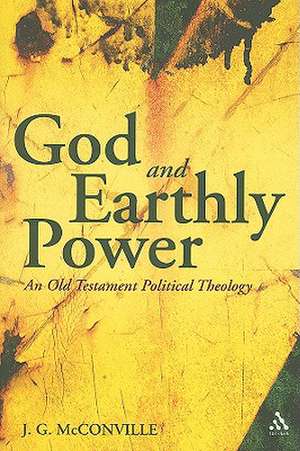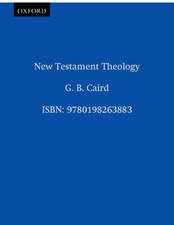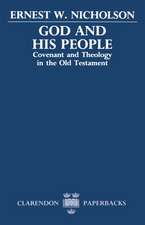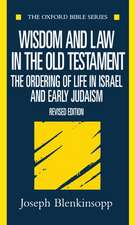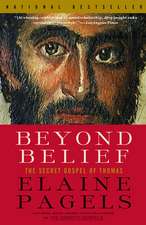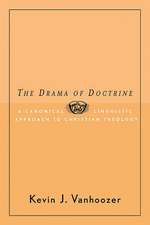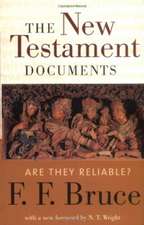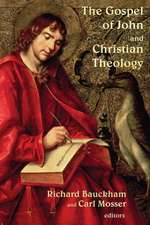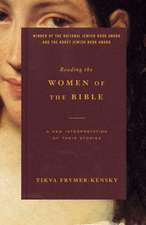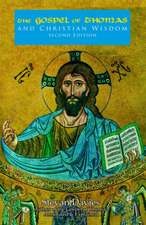God and Earthly Power: An Old Testament Political Theology: The Library of Hebrew Bible/Old Testament Studies
Autor J. G. McConvilleen Limba Engleză Paperback – 30 iul 2008
In God and Earthly Power J. G. McConville considers the nature of human power in the light of belief in God. The Bible, and especially the Old Testament, is relevant to the question, not least because perceptions about the use of power in relation to God are often derived correctly or incorrectly from it. This book thus aims to address a world in which God's power is often invoked, from quite different quarters, in order to justify political and military action.
McConville's interpretation of the Old Testament focuses on Deuteronomy and the narrative in which it is set, because these are especially fruitful for political thinking. His case is argued for both exegetically and in relation to the actual use of the Old Testament in the history of political thought. McConville's core argument is that divine power, mediated through Torah, results in human freedom and a mandate for the political responsibility of citizens. Indeed, it is even the best guarantee of these.
.
McConville's interpretation of the Old Testament focuses on Deuteronomy and the narrative in which it is set, because these are especially fruitful for political thinking. His case is argued for both exegetically and in relation to the actual use of the Old Testament in the history of political thought. McConville's core argument is that divine power, mediated through Torah, results in human freedom and a mandate for the political responsibility of citizens. Indeed, it is even the best guarantee of these.
.
Din seria The Library of Hebrew Bible/Old Testament Studies
- 30%
 Preț: 599.90 lei
Preț: 599.90 lei -
 Preț: 159.16 lei
Preț: 159.16 lei - 30%
 Preț: 541.20 lei
Preț: 541.20 lei - 23%
 Preț: 192.01 lei
Preț: 192.01 lei -
 Preț: 99.41 lei
Preț: 99.41 lei - 30%
 Preț: 509.52 lei
Preț: 509.52 lei - 23%
 Preț: 192.36 lei
Preț: 192.36 lei - 30%
 Preț: 509.93 lei
Preț: 509.93 lei -
 Preț: 222.84 lei
Preț: 222.84 lei -
 Preț: 168.54 lei
Preț: 168.54 lei - 30%
 Preț: 655.82 lei
Preț: 655.82 lei - 22%
 Preț: 568.29 lei
Preț: 568.29 lei - 23%
 Preț: 190.50 lei
Preț: 190.50 lei -
 Preț: 472.27 lei
Preț: 472.27 lei - 30%
 Preț: 665.45 lei
Preț: 665.45 lei - 23%
 Preț: 193.80 lei
Preț: 193.80 lei - 30%
 Preț: 656.06 lei
Preț: 656.06 lei - 30%
 Preț: 538.77 lei
Preț: 538.77 lei - 24%
 Preț: 508.76 lei
Preț: 508.76 lei -
 Preț: 168.76 lei
Preț: 168.76 lei -
 Preț: 472.23 lei
Preț: 472.23 lei -
 Preț: 172.88 lei
Preț: 172.88 lei - 30%
 Preț: 510.04 lei
Preț: 510.04 lei - 30%
 Preț: 893.55 lei
Preț: 893.55 lei - 30%
 Preț: 508.44 lei
Preț: 508.44 lei - 30%
 Preț: 598.02 lei
Preț: 598.02 lei - 30%
 Preț: 774.62 lei
Preț: 774.62 lei - 30%
 Preț: 509.52 lei
Preț: 509.52 lei -
 Preț: 470.75 lei
Preț: 470.75 lei -
 Preț: 170.02 lei
Preț: 170.02 lei - 30%
 Preț: 714.35 lei
Preț: 714.35 lei - 30%
 Preț: 773.71 lei
Preț: 773.71 lei - 27%
 Preț: 1122.64 lei
Preț: 1122.64 lei - 22%
 Preț: 1122.47 lei
Preț: 1122.47 lei - 22%
 Preț: 1125.50 lei
Preț: 1125.50 lei - 22%
 Preț: 1066.87 lei
Preț: 1066.87 lei - 22%
 Preț: 1121.17 lei
Preț: 1121.17 lei - 22%
 Preț: 1005.18 lei
Preț: 1005.18 lei - 22%
 Preț: 1123.94 lei
Preț: 1123.94 lei - 22%
 Preț: 1131.53 lei
Preț: 1131.53 lei - 22%
 Preț: 768.98 lei
Preț: 768.98 lei - 22%
 Preț: 1120.52 lei
Preț: 1120.52 lei - 22%
 Preț: 827.69 lei
Preț: 827.69 lei - 22%
 Preț: 889.49 lei
Preț: 889.49 lei - 30%
 Preț: 714.27 lei
Preț: 714.27 lei - 22%
 Preț: 1128.93 lei
Preț: 1128.93 lei - 22%
 Preț: 1125.82 lei
Preț: 1125.82 lei - 22%
 Preț: 1064.75 lei
Preț: 1064.75 lei - 22%
 Preț: 893.15 lei
Preț: 893.15 lei - 18%
 Preț: 384.21 lei
Preț: 384.21 lei
Preț: 298.74 lei
Preț vechi: 325.78 lei
-8% Nou
Puncte Express: 448
Preț estimativ în valută:
57.17€ • 61.13$ • 47.66£
57.17€ • 61.13$ • 47.66£
Carte tipărită la comandă
Livrare economică 17 aprilie-01 mai
Preluare comenzi: 021 569.72.76
Specificații
ISBN-13: 9780567045706
ISBN-10: 0567045706
Pagini: 224
Dimensiuni: 156 x 234 x 18 mm
Greutate: 0.39 kg
Editura: Bloomsbury Publishing
Colecția T&T Clark
Seria The Library of Hebrew Bible/Old Testament Studies
Locul publicării:London, United Kingdom
ISBN-10: 0567045706
Pagini: 224
Dimensiuni: 156 x 234 x 18 mm
Greutate: 0.39 kg
Editura: Bloomsbury Publishing
Colecția T&T Clark
Seria The Library of Hebrew Bible/Old Testament Studies
Locul publicării:London, United Kingdom
Caracteristici
An ability to engage critically with modern ideas and impressions (western and non-western) about how God may be invoked in relation to political, and thus military, action
Cuprins
Contents
1. The Problem of God in Human Policy
2. The Old Testament in Biblical Theology and Ethics
3. Mediations of Power in the OT
4. An Old Testament Political Theology
5. OT Political Theology and Christian Political Thought
6. Conclusions
2. The Old Testament in Biblical Theology and Ethics
3. Mediations of Power in the OT
4. An Old Testament Political Theology
5. OT Political Theology and Christian Political Thought
6. Conclusions
Recenzii
'Professor McConville here aims to "contribute to a discussion of how the Old Testament might be understood politically, both in its own terms and in relation to the modern world." It is a great contribution to that discusson, one that deserves to be read carefully by anyone interested in Old Testament theology or ethics, or in narrative interpretation.' John Goldingay, David Allan Hubbard Professor of Old Testament, Fuller Theological Seminary, USA
Mention -Book News, February 2009
"[Focuses] on contemporary problems that face the modern political theologian, such as whether religions' involvement in politics is tyrannous or liberating, and whether one form of political institution is better than another." Expository Times, December 2009
"First, McConville is to be commended for the clarity with which he delineates the central importance of biblical confession of one God for political theology. Without appreciation for what within the Bible is the first commandment, it is impossible to construct the foundation for a theo-political vision that is both faithful to biblical tradition and beneficial to the people God's disciples are called to serve. Second, by identifying sedakah (righteousness/justice) as lying at the heart of God's nature, and by extension, being built into the very structure of all creation and all humans ('image of God'), McConville provides profound insight into that which enables the Bible to offer hope for a peaceable and just world order. Finally, McConville's interpretation of the laws constituting the Torah as applications of Israel's understanding of earthly institutions as responses to God's creational purposes, rather than as timeless rules reflective of a timeless order (as in the Egypt of the Pharaohs), opens up the Bible's legal traditions for contemporary moral reflection. Similarly, his explanation of the balancing of powers between judiciary, monarchy, priesthood, and prophecy in the Deuteronomistic polity (regarding which he acknowledges indebtedness to S. Dean McBride) directly relates to present-day political-philosophical debate." -Paul D. Hanson, Interpretation, July 2010
"This book is controversial, and it wants to be. I highly recommend it both for the quality of its arguments and the fresh perspective it brings to the question as to whether or not Genesis-Kings have a postive contrribution to make to political thought and practice today." Journal for the Study of the Old Testament, June 2009
McConville's study is so interesting because the difference between a political science exegesis and political theology is made clear. The former searches after concepts and their historical journeys; the latter understands God as the subject of the texts transcending every historical context . . . The book offers very well informed analyses of numerous Pentateuch texts.
Mention -Book News, February 2009
"[Focuses] on contemporary problems that face the modern political theologian, such as whether religions' involvement in politics is tyrannous or liberating, and whether one form of political institution is better than another." Expository Times, December 2009
"First, McConville is to be commended for the clarity with which he delineates the central importance of biblical confession of one God for political theology. Without appreciation for what within the Bible is the first commandment, it is impossible to construct the foundation for a theo-political vision that is both faithful to biblical tradition and beneficial to the people God's disciples are called to serve. Second, by identifying sedakah (righteousness/justice) as lying at the heart of God's nature, and by extension, being built into the very structure of all creation and all humans ('image of God'), McConville provides profound insight into that which enables the Bible to offer hope for a peaceable and just world order. Finally, McConville's interpretation of the laws constituting the Torah as applications of Israel's understanding of earthly institutions as responses to God's creational purposes, rather than as timeless rules reflective of a timeless order (as in the Egypt of the Pharaohs), opens up the Bible's legal traditions for contemporary moral reflection. Similarly, his explanation of the balancing of powers between judiciary, monarchy, priesthood, and prophecy in the Deuteronomistic polity (regarding which he acknowledges indebtedness to S. Dean McBride) directly relates to present-day political-philosophical debate." -Paul D. Hanson, Interpretation, July 2010
"This book is controversial, and it wants to be. I highly recommend it both for the quality of its arguments and the fresh perspective it brings to the question as to whether or not Genesis-Kings have a postive contrribution to make to political thought and practice today." Journal for the Study of the Old Testament, June 2009
McConville's study is so interesting because the difference between a political science exegesis and political theology is made clear. The former searches after concepts and their historical journeys; the latter understands God as the subject of the texts transcending every historical context . . . The book offers very well informed analyses of numerous Pentateuch texts.
